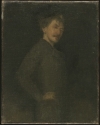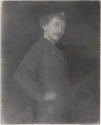The Paintings of James McNeill Whistler
YMSM 416
Self-Portrait

Date
Self-Portrait may have been started in 1893 or 1894 but the technique is not totally typical of that period, and may indicate a later date.
1894: Arthur Jerome Eddy (1859-1920) saw a self-portrait in Whistler's studio, but mentioned no details. 1
1893/1894: Walter Richard Sickert (1860-1942) remembered seeing Whistler at work on several self-portraits, possibly including this: he does not specify a date but it could have been when Whistler was painting Green and Violet: Portrait of Mrs Walter Sickert y338. 2 The Pennells also suggest a date of 1893/1894 for a self-portrait that was reworked in 1896 or later. 3
1895: Beatrice Philip (Mrs E. W. Godwin, Mrs J. McN. Whistler) (1857-1896) wrote to the art dealer Edward Guthrie Kennedy (1849-1932) that Whistler was painting a portrait, possibly this one or Self-Portrait y124 or Brown and Gold y440. She wrote: 'He thinks he will be through with his portrait by the end of next week.' 4
1896: It had been suggested that this was the self-portrait described by the Pennells as 'in the white jacket, which was changed into a black coat after Mrs. Whistler's death' in 1896, but there is absolutely no trace of this white jacket under the thinly painted self-portrait in its present state. 5
Images

Self-Portrait, Fogg Art Museum

Self-Portrait, Fogg Art Museum, photograph, 1980

Brown and Gold, The Hunterian

Gold and Brown, National Gallery of Art, Washington, DC

London Stereoscopic Co., J. McN. Whistler, 1879, GUL Whistler PH1/97

H. S. Mendelssohn, J. McN. Whistler, 1884/1885, albumen print, GUL Whistler PH1/108
Subject
Titles
Whistler's title is not known. The suggested title is:
- 'Self-Portrait' (1980, YMSM). 6
Description

Self-Portrait, Fogg Art Museum
A three-quarter length portrait of Whistler wearing a dark jacket, and facing three-quarter right, with his right hand on hip, and his left arm hidden. His hair is dark and curly, with a greyish-white curl above his forehead. His shirt is not visible. The background is very dark. The portrait is in vertical format.
Sitter

London Stereoscopic Co., J. McN. Whistler, 1879, GUL Whistler PH1/97
James McNeill Whistler (1834-1903).

Self-Portrait, Fogg Art Museum

Brown and Gold, The Hunterian

Gold and Brown, National Gallery of Art, Washington, DC
Self-portraits of Whistler include Brown and Gold y440, Self-Portrait y460, Self-Portrait y461, and Gold and Brown y462.
Technique
Composition

Self-Portrait, Fogg Art Museum
The Pennells described Whistler at work on a self-portrait, 'in the white jacket, which was changed into a black coat after Mrs. Whistler's death' in 1896. 7 It could be this portrait but if so there is no trace of the white jacket.

H. S. Mendelssohn, J. McN. Whistler, 1884/1885, albumen print, GUL Whistler PH1/108
The portrait closely resembles a studio photograph of the artist, taken by H. S. Mendelssohn, London, about 1890.
Technique

Self-Portrait, Fogg Art Museum
It is on a fine irregular weave canvas, and painted with a smooth overall finish fairly typical of Whistler's work in the mid-1890s. The soft, blurred surfaces were probably rubbed down by the artist to create the effect of a figure barely emerging from shadows. The portrait is in vertical format.
Conservation History
Unknown.
Frame
Frame: 40 x 34.3 x 2.5 cm (15 3/4 x 13 1/2 x 1").
History
Provenance
- After 1903: sold by Jean Guiffrey (1870-1952), Paris, to Percy Moore Turner (1877-1950), London art dealer;
- By 1929: sold by Turner to E. A. Lewis (dates unknown), London;
- 1929: sold by Lewis through Joseph Stransky, New York art dealer, to Grenville Lindell Winthrop (1864-1943), New York;
- 1943: bequeathed by Winthrop to Harvard University.
The early history of this painting is not clear. According to Manson, Whistler gave the painting to a re-liner in Paris, possibly in payment for work done. 8
In the early 1890s Whistler was living in Paris but seems strange that he should have given away a self-portrait, and equally strange that any picture-framer would accept a picture in lieu of payment. Claude Chapuis (1829-1908) was his main re-liner in Paris. He was a picture liner for the National Museums of France. By 1900 his nephews, 'Messieurs Brisson', had joined Chapuis' firm and were listed as Chapuis’ successors in the Paris Almanach for 1901. In the late 1890s Whistler was worried about paintings being taken from his studio or lost in some way, and he was certainly sending pictures to Chapuis/Brisson in 1900. However there is no correspondence to help establish any history of this portrait in Whistler's lifetime, nor is there any documentation to support the provenance before 1929.
Winthrop, who bought the picture in 1929, was informed that it was given by the artist to one of his frame-makers who sold it to one of the officials of the Louvre after 1903, who then sold it to the Keeper of paintings in the Louvre, Jean Guiffrey, who in turn sold it to P. M. Turner, from whom it was bought by E. A. Lewis by August 1929. It was bought from Lewis through Stransky by G. L. Winthrop in 1929 for £1500 and bequeathed by him to Harvard University.
Exhibitions
It was not exhibited in Whistler's lifetime.
Bibliography
Catalogues Raisonnés
- Young, Andrew McLaren, Margaret F. MacDonald, Robin Spencer, and Hamish Miles, The Paintings of James McNeill Whistler, New Haven and London, 1980 (cat. no. 416), plate 256, as 'Self-Portrait'.
Authored by Whistler
- None.
Catalogues 1855-1905
- None.
Journals 1855-1905
- None.
Monographs
- None.
Books on Whistler
- Denker, Eric, In Pursuit of the Butterfly, Seattle, 1995.
- Pennell, Elizabeth Robins, and Joseph Pennell, The Life of James McNeill Whistler, 5th (revised) edition, London and Philadelphia, 1911, p. 322.
Books, General
- Robins, Anna Gruetzner (ed.), Walter Sickert: the Complete Writings on Art, Oxford, 2000, p. 195.
Catalogues 1906-Present
COLLECTION:
- Stebbins, Theodore E., Jr., Virginia Anderson, and Kimberly Orcutt, ed., American Paintings at Harvard, Volume Two, Paintings, Drawings, Pastels and Stained Glass by Artists Born 1826-1856, Cambridge, MA and New Haven, CT, 2008, p. 431-32 (cat. no. 459), repr.
EXHIBITION:
- Master Paintings from the Fogg Collection, Fogg Art Museum, Cambridge, MA, 1977.
Journals 1906-Present
- Manson, James B., ‘An Unknown Painting by Whistler’, Apollo, vol. 10, 1929, p. 104, repr. p. 104.
- Sickert, Walter Richard, ‘Where Paul and I differ’, Art News, no. 14, 10 February 1910, p. 113.
Websites
- Fogg Museum website at https://www.harvardartmuseums.org/collections?q=1943.930.
Unpublished
- Revillon, Joseph Whistler, Draft Catalogue Raisonné of the Paintings of J. McN. Whistler, [ca 1945-1955], Glasgow University Library (cat. no. 7) 'Self portrait'.
Other
- None.
Notes:
1: Eddy to Whistler, 5 December [1894], GUW #01019.
2: Sickert 1910 [more].
3: Pennell 1911 A [more], p. 322.
4: [May/June 1895], GUW #09725.
5: Pennell 1911, op. cit., p. 322. Report by Teri Hensick, forwarded by Miriam Stewart, curator, Harvard Art Museums, to M. F. MacDonald, 5 January 2017, GUL WPP file.
6: YMSM 1980 [more] (cat. no. 416).
7: Pennell 1911 A [more], p. 322.
8: Manson 1929 [more], repr. p. 104.